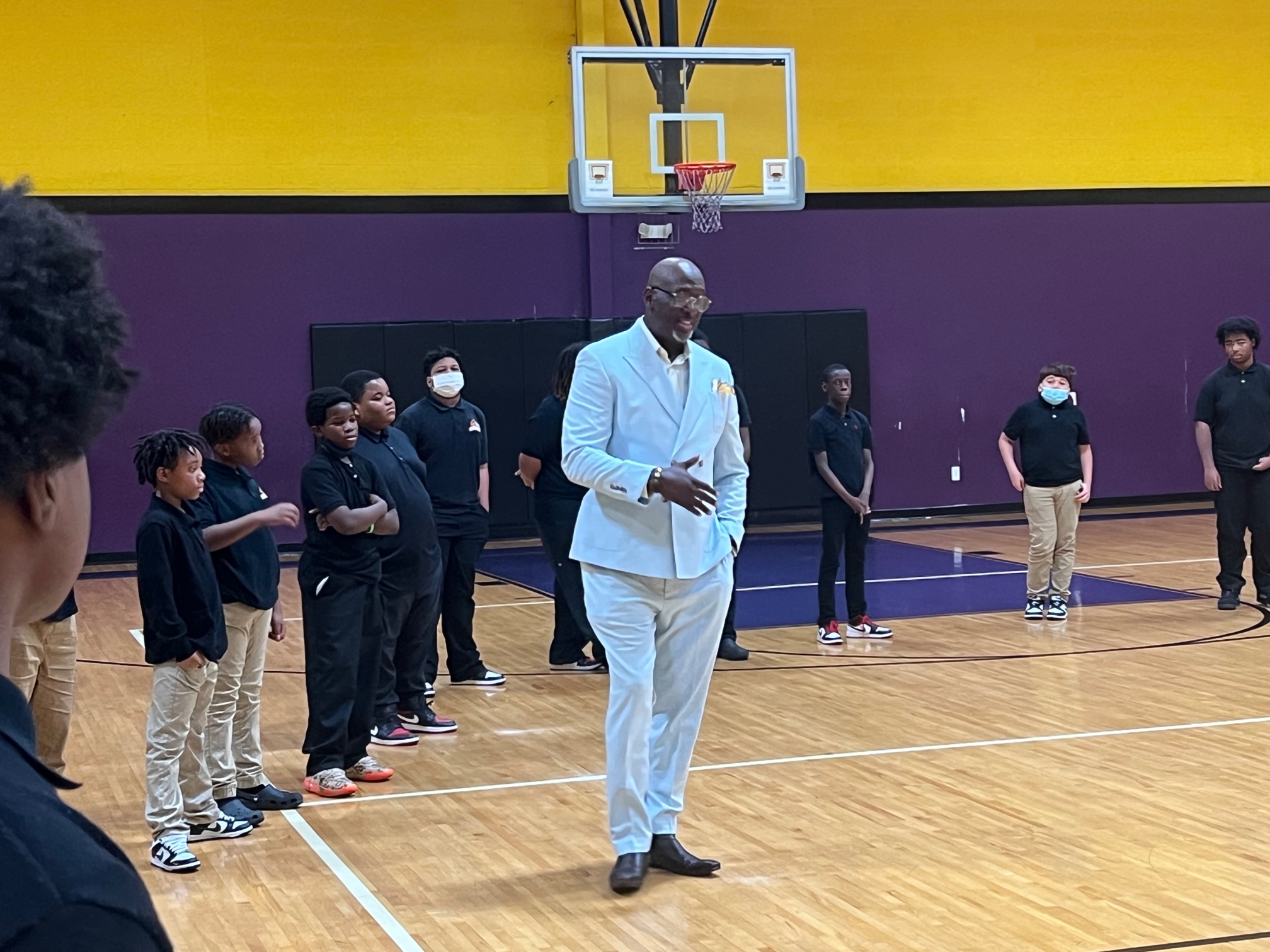How Mentorship Supports Student Mental Health at Detroit Innovation Academy
When it was safe to return to school after the worst of the COVID-19 pandemic, Marina Hanna Kaminski was thrilled to see her students fill the classrooms at Detroit Innovation Academy, a small K-8 charter school in Detroit’s Cody Rouge neighborhood.
Somehow, though, things weren’t exactly the same as before, says Kaminski, who has served as Detroit Innovation Academy’s principal for the past six years.
“I started noticing a real shift in our students’ behavior and mindset. They were struggling with their self-esteem. They were having trouble connecting with their peers and even just communicating with their peers,” Kaminski says.
Lack of social experiences and isolation led to behavior problems among students — and Kaminski wanted to support the mental health of her students as they returned to on-site learning. She worked to create a mentoring program with a difference. Many schools have mentors to support student academics, but few are focused solely on mental health.
“It hit me at that time that we needed a solid mentoring program to help them work through these challenges. The pandemic had taken a toll and we needed a way to support our students in rebuilding their confidence and finding their voice and forming those meaningful relationships with each other,” Kaminski explains.
Why Detroit Innovation Academy decided to offer mentorship programs to students
Kaminski sought the support of two established Detroit-based mentoring programs — Building Better Men and PrettyBrownGirl — and sought staff recommendations for students who could benefit from participating in evidence-based programming.
“Initially, we were just offering it to middle school students because those were the students I noticed were having the most difficulty after COVID with transitioning back,” Kaminski explains. “And this past school year, we expanded it to third- through eighth-grade students as well.”
DIA offered separate weekly groups for elementary and middle school students, with about 20 students in each group, experimenting with after school meetings and school-day programming, similar to a “specials” class, like art or gym.
“For Building Better Men, they really try to equip the males with showing them they can be successful despite their challenges and their experiences in life. Their philosophy is to address those complex needs of African American males and provide that intervention through advice and practice and developing social skills and offering a positive role model and alternative choices,” Kaminski says. Through literacy-based programs, young men learn appropriate social behaviors and self-esteem.
“They typically start with playing basketball, and that leads to more of a conversation where they build trust with the individual they are speaking to,” she adds. “They start with activities that break down the walls and allow them to open up.”
In PrettyBrownGirl sessions, young ladies at Detroit Innovation Academy are empowered to be confident and proud through leadership and camaraderie-supporting opportunities, she says. “They learn a lot of self-love talk and character-building and leadership skills.” PrettyBrownGirl supports students with culturally responsive social-emotional learning practices.
How students are benefiting from mentorship programming
Participating students offer positive feedback, according to Kaminski. And, they’re developing valuable relationships with their mentors.
“I’ve noticed a lot of benefits in their mental health because it gives them someone to talk to — someone who may have experienced similar things growing up,” Kaminski says. “They develop bonds with their mentors where it’s almost like having a safety net. The mentors show them how to handle different challenging situations or tough situations they can be in, and, while doing that, build their confidence and be a positive influence overall.”
This level of support is important for students who don’t have encouragement at home, or who don’t connect with their parents. And, having dedicated organizations and experienced mentors allows students a safe place to build trusting relationships.
“Sometimes students don’t want to necessarily talk to their teachers or open up to their teachers because they may feel they’re being judged,” Kaminski says. “I wanted to give them an alternative person if they didn’t feel comfortable sharing with anyone at the school, they can at least have another mentor, another person in their life they could go to.”
Detroit Innovation Academy’s two mentorship programs are so much more than pairing students with mentors, Kaminski says. “It’s about creating a community that supports the whole child. And it’s about helping them grow into capable, confident and compassionate individuals.”
This is critical in today’s social media-saturated society.
“That, on its own, can take a huge toll on someone’s mental health,” she says. “It’s really important to prioritize giving students another outlet to share their feelings and share their emotions with someone.”
Why back-to-school time is so important for establishing trust and positive relationships
The relative freedom of summer is not always joyful for every student. Recognizing this, Kaminski says teachers at Detroit Innovation Academy focus intensely on the back-to-school time period. She leads professional development to help teachers transition their students from summer to fall in a supportive classroom setting.
“You have to consider that every summer was not necessarily a positive one for our students. Some of them didn’t go anywhere, some of them were home and might not have been safe. We are a beacon of hope for some scholars. Coming here is their safety net,” Kaminski says.
The first two weeks of the school year are dedicated to trauma-informed instruction through “Character Camp,” a time focused on building relationships between teachers and students. What home situations do students have? What are their fears?
Character Camp is a two-week investment that pays dividends throughout the school year, she says.
“It’s a lot of different ice-breaker activities where they’re just getting to know their students. Before our students can trust you and learn from you, they have to understand where you’re coming from,” Kaminski says. “They have to know that you care about them.”
Learn more about Detroit Innovation Academy at diachampion.org.

